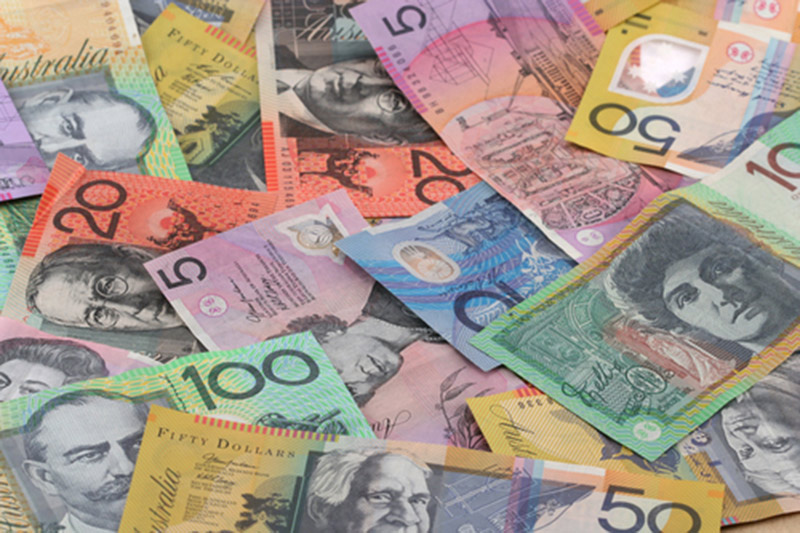Investing.com -The Australian dollar was down ahead of a survey on business outlooks and as China gets set to release price data that will be closely watched for signs of deflation.
AUD/USD traded at 0.7687, down 0.25%, while USD/JPY changed hands at 121.27, up 0.09% and EUR/USD fell 0.05% to 1.0847 as Greece talks continue.
In Australia comes NAB Business Conditions and Business Confidence are due at 1130 Sydney time (0030 GMT). Both conditions and confidence were below the
long-run average in January and some improvement in response to the RBA's cash rate cut in February would be looked favorably by the market.
In China, Feb CPI and PPI data are due at 0930 local time (0130 GMT). Confirmation that the CPI rose 0.9% year-on-year against January's 0.8% gain and that the PPI dropped 4.4%, more than the previous 4.3% fall, will help explain the surprise decision to cut benchmark interest rates for a second time in three months last weekend, ahead of the start of the politically-sensitive NPC meetings.
Overnight, the dollar remained lower against a basket of other major currencies on Monday, holding just under a 11-1/2 year peak as investors locked in profits from Friday's rally sparked robust U.S. jobs data.
The U.S. dollar index, which measures the greenback’s strength against a trade-weighted basket of six major currencies, was at 97.64, up 0.01%.
Friday’s stronger-than-expected U.S. employment report solidified expectations that the Federal Reserve will raise interest rates around the middle of this year, boosting the dollar.
The euro remained under pressure as the eurogroup of euro zone finance ministers prepared to hold talks to discuss a reform package put forward by Greece as part of its bailout review.
Last month Athens reached a temporary agreement with its lenders to extend its bailout by four months, but the reform package must be signed off by creditors before it can access further financial aid.
Ahead of the talks eurogroup head Jeroen Dijsselbloem warned that Greece must stop wasting time and start developing its reform package.
Also Monday, the European Central Bank confirmed that it started asset purchases under its quantitative easing program.
- English (UK)
- English (India)
- English (Canada)
- English (Australia)
- English (South Africa)
- English (Philippines)
- English (Nigeria)
- Deutsch
- Español (España)
- Español (México)
- Français
- Italiano
- Nederlands
- Português (Portugal)
- Polski
- Português (Brasil)
- Русский
- Türkçe
- العربية
- Ελληνικά
- Svenska
- Suomi
- עברית
- 日本語
- 한국어
- 简体中文
- 繁體中文
- Bahasa Indonesia
- Bahasa Melayu
- ไทย
- Tiếng Việt
- हिंदी
Forex - Aussie weaker ahead of NAB survey, China data on prices
Published 03/09/2015, 06:59 PM
Updated 03/09/2015, 07:00 PM
Forex - Aussie weaker ahead of NAB survey, China data on prices

Latest comments
Install Our App
Risk Disclosure: Trading in financial instruments and/or cryptocurrencies involves high risks including the risk of losing some, or all, of your investment amount, and may not be suitable for all investors. Prices of cryptocurrencies are extremely volatile and may be affected by external factors such as financial, regulatory or political events. Trading on margin increases the financial risks.
Before deciding to trade in financial instrument or cryptocurrencies you should be fully informed of the risks and costs associated with trading the financial markets, carefully consider your investment objectives, level of experience, and risk appetite, and seek professional advice where needed.
Fusion Media would like to remind you that the data contained in this website is not necessarily real-time nor accurate. The data and prices on the website are not necessarily provided by any market or exchange, but may be provided by market makers, and so prices may not be accurate and may differ from the actual price at any given market, meaning prices are indicative and not appropriate for trading purposes. Fusion Media and any provider of the data contained in this website will not accept liability for any loss or damage as a result of your trading, or your reliance on the information contained within this website.
It is prohibited to use, store, reproduce, display, modify, transmit or distribute the data contained in this website without the explicit prior written permission of Fusion Media and/or the data provider. All intellectual property rights are reserved by the providers and/or the exchange providing the data contained in this website.
Fusion Media may be compensated by the advertisers that appear on the website, based on your interaction with the advertisements or advertisers.
Before deciding to trade in financial instrument or cryptocurrencies you should be fully informed of the risks and costs associated with trading the financial markets, carefully consider your investment objectives, level of experience, and risk appetite, and seek professional advice where needed.
Fusion Media would like to remind you that the data contained in this website is not necessarily real-time nor accurate. The data and prices on the website are not necessarily provided by any market or exchange, but may be provided by market makers, and so prices may not be accurate and may differ from the actual price at any given market, meaning prices are indicative and not appropriate for trading purposes. Fusion Media and any provider of the data contained in this website will not accept liability for any loss or damage as a result of your trading, or your reliance on the information contained within this website.
It is prohibited to use, store, reproduce, display, modify, transmit or distribute the data contained in this website without the explicit prior written permission of Fusion Media and/or the data provider. All intellectual property rights are reserved by the providers and/or the exchange providing the data contained in this website.
Fusion Media may be compensated by the advertisers that appear on the website, based on your interaction with the advertisements or advertisers.
© 2007-2024 - Fusion Media Limited. All Rights Reserved.